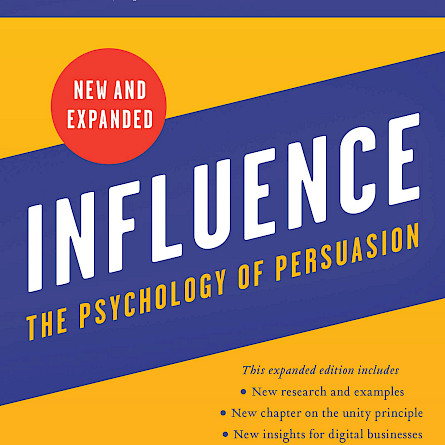My daughter, who just finished her first year of university, is interested, among other things, in psychology and business. So, I recommended that she read Influence, and at the same time, I decided to refresh my memory by rereading it.
We all try to reduce the number of decisions we have to make each day. That’s actually a very good thing: if we had to conduct a detailed analysis for every decision, our brains would quickly overheat! For most of the decisions we make, we’ve developed automatic reflexes that serve us well in most cases. The catch is that in certain situations, the autopilot can lead us to major and costly mistakes.
Influence presents six psychological principles:
-
Reciprocity. If someone gives us something or does us a favor, we automatically feel indebted to them.
-
Commitment and consistency. Once a person commits to an idea or action—especially if done publicly and in writing—they tend to act consistently with that commitment.
-
Social proof. We are influenced in our actions by the behavior of those around us.
-
Authority. We are influenced by people we perceive as authority figures or experts.
-
Liking (or affection). We are more influenced by people we like, find attractive, or who resemble us.
-
Scarcity. What appears rare or in limited supply seems more desirable.
I’ve therefore decided to present a series of blog posts, each addressing one of these six principles using examples and applying them to the world of investing.
The first principle I wish to discuss is social proof. According to this principle, one way we determine the best course of action is by observing what others believe is the right thing to do. If everyone seems to be acting that way, it must be a good idea to follow suit, right?
The principle of social proof works even better when we are in a situation of uncertainty. Think about it: when we don’t know what to do, we all tend to look around to see what others are doing and let that guide us.
Another factor that strengthens the power of social proof is the similarity between us and the people we see acting around us. This probably helps explain the influence of social media, where most people cluster with those who think or act like them. The tendency of teenagers to behave like their friends is also especially strong.
So, if we see a long line outside an establishment, restaurant, or store, our first instinct will probably be to get in line. That’s why some places, like certain nightclubs, make people wait in line outside. It’s also why restaurant managers prioritize filling tables near the windows to give the impression from the outside that the place is popular.
This is likely the reason why some influencers on social media have such a strong impact on their followers’ behavior, and why some companies are willing to pay them large sums to endorse their products.
The phenomenon of social proof is just as powerful and pervasive in the stock market, where we all tend to follow the behavior of other investors—especially if they are showing strong short-term gains. This explains why bubbles frequently form in certain sectors, as was the case with the cannabis industry a few years ago. The fact that the stock market is highly uncertain and unpredictable pushes us to imitate other investors’ behavior: “If everyone is doing it, it must be a good thing.”
Dr. Cialdini warns us about this tendency to fall victim to social proof. Advertising and business practices that exploit this psychological principle can easily impair our judgment.
As with the other psychological principles, the best way to counter the influence of social proof is to understand how it works and to identify moments when the social proof autopilot kicks in, pushing us to make automatic decisions. It’s important to remain alert and aware that we can be manipulated by unethical salespeople or by market crowd movements.
In investing, as with all important decisions, it is crucial to focus on facts and conduct an objective analysis of both positive and negative factors before making an informed—or at least educated—decision.
Philippe Le Blanc, CFA, MBA
Chief Investment Officer at COTE 100
_______
Philippe Le Blanc’s Blog is published in






